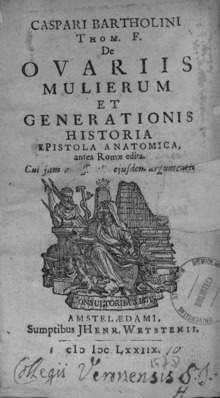Caspar Bartholin the Younger

Caspar Bartholin the Younger (
Early life and education
Bartholin was born in
Academic career

Bartholin started his medical studies in 1671 at the age of 16. From 1674, he studied in the Netherlands, France and Italy. When he returned to Denmark in 1677, he was appointed lecturer of natural philosophy at the University of Copenhagen. The following year he gained his medical degree and was made full professor at the University of Copenhagen. He described the
In 1690, he left his academic career to become a high court judge, becoming Procurator General in 1719, and Deputy of Finance in 1724.
Hagestedgård
Bartholin inherited the
Works
- De tibiis veterum et earum antiquo usu, p. PP7, at Google Books. Rome: B. Carrara, 1677 (Bartholin also wrote about music)
- De ovariis mulierum et generationis historia epistola anatomica, p. PA1, at Google Books. Amsterdam: J. H. Wetstein, 1678
References
- ^ "Bartholin's gland". Random House Webster's Unabridged Dictionary.
- ^ "Kasper Bartholin d. y., den föregåendes broder, f. 1655, d. 1738". Nordisk familjebok. Retrieved January 1, 2019.
- ^ Caspar Bartholin - læge Dansk Biografisk Leksikon Retrieved December 1, 2020
- S2CID 24745790.
- ^ ISBN 978-1-4724-3958-1.
- ^ "Hagestedgaard: Ejerhistorie". danskeherregaarde.dk. Archived from the original on 27 August 2018. Retrieved 25 August 2018.
- ^ "Sag: Hagestedgård". kulturarv.dk. Retrieved January 1, 2019.
